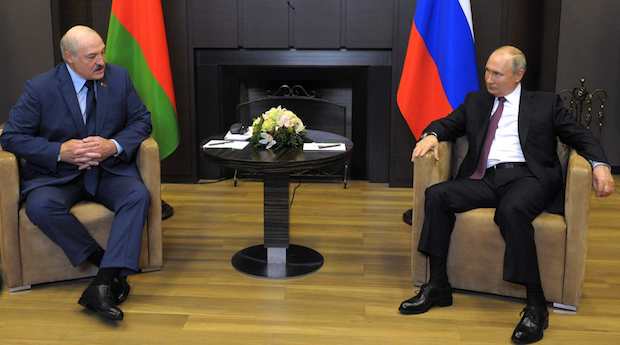
Ryanair scandal sends Lukashenko running back to Putin
Russia continues to position itself as the only remaining friend of Belarusian President Alexander Lukashenko, sacrificing significant tranches of Russian money and even its own citizens. The reason is obvious: only with Lukashenko in power can the Kremlin ensure Belarus remains economically dependent on Russia. The expected Western sanctions after a Ryanair jet was forced to land in Belarus so the authorities could arrest a journalist will only deepen that dependence.
- On the record, Russian officials insist Moscow knew nothing of Lukashenko’s intentions to force the Ryanair plane into an emergency landing – and for once, this is believable. After last summer’s opposition protests, Lukashenko has been in need of Russia’s help more than ever. However, he does not automatically discuss every important political issue with Moscow. And the Kremlin is busy preparing for President Vladimir Putin’s June 16 summit with U.S. President Joe Biden, so any new scandal involving Lukashenko is an unwelcome distraction.
- Moreover, there is little personal sympathy for Lukashenko in the Kremlin, and the general reaction to Lukashenko’s antics can usually be read in the stony-faced expression adopted by Prime Minister Mikhail Mishustin when he is sent to Minsk to calm the latest crisis. In September, Mishustin had the misfortune to be required to sit through Lukashenko’s conspiracy theories about ‘intercepted NATO communiques’. And last Thursday, he wore the same anguished look while defending Lukashenko at talks in Minsk.
- Even so, Russia continues to offer rhetorical support to the Belarusian leader. Foreign Ministry officials spent the whole week berating the European Union for its angry reaction to the Ryanair incident, and wasted no opportunity to remind everyone about when a jet carrying Bolivian president Evo Morales was grounded in Vienna in 2013 because it was suspected of having whistleblower Edward Snowden on board. Putin brought up this incident Friday when he welcomed Lukashenko to his residence near the Black Sea resort town of Sochi.
- Criticism of Putin has largely revolved around Russia’s apparent indifference to the fate of one of its citizens, Sofia Sapega, the girlfriend of journalist Roman Protasevich who was arrested when the Ryanair flight was forced down. Sapega was also detained and now faces obviously trumped-up charges of organizing mass disorder. Lukashenko’s dependence on Putin is such that Russia could easily demand her release but, so far, nothing has been done. As Putin and Lukashenko met in Sochi, a Minsk court ruled Sapega’s detention was legal.
- Putin is far more concerned with global issues. His conversation with Lukashenko lasted over five hours and, in keeping with tradition, the details were kept secret. But there is little doubt Lukashenko asked Putin for economic support when the EU imposes new sanctions.
- This time, the sanctions may be serious. According to Bloomberg and Reuters, the EU is considering sanctions targeting two key Belarusian exports: potash fertilizers and oil products (the first seems far more likely). In theory, the U.S. could copy Europe.
- The Bell spoke to several Belarusian economists who agreed that any export ban on fertilizer or oil products would be catastrophic. “The Belarusian economy can be stifled by sanctions on just two export categories – oil and fertilizer. An export ban on those would wipe out the country’s entire export potential, reducing GDP by 15 to 20 percent and make it simply impossible for Belarus to exist as an independent state,” said Jaroslav Romanchuk, director of the Minsk-based Mises research center. Such sanctions would cause a sharp drop in foreign-currency earnings, putting pressure on the Belarusian ruble and, potentially, leaving the country unable to service its foreign debt, according to Katerina Bornukova, director of the BEROC Belarusian Economic Center. She added that a collapse in the bond market could spark a banking crisis that would oblige Russia to commit billions of dollars if it wanted to keep the Belarusian economy afloat.
Why the world should care
The parlous state of the Belarusian economy is one reason why — in spite of everything — the Kremlin puts up with Lukashenko. Only with Lukashenko in power can Belarus be forced to become a Russian vassal state. The Kremlin sees this as the way to keep the country in Russia’s orbit and push political integration (something Lukashenko has evaded for 20 years). The only problem is that most Belarusians oppose integration — and Russia’s backing for Lukashenko reduces its popularity inside Belarus.




